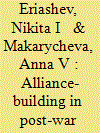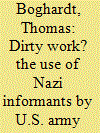| Srl | Item |
| 1 |
ID:
183409


|
|
|
|
|
| Summary/Abstract |
Although great powers may forge ad hoc coalitions to attain their short-
term goals, this does not diminish the role of long-term strategic alliances.
The alliance theory has long become a separate strand of IR. However,
most scholars have focused more on external rather than internal threats
to account for alliance choices. The authors review the existing literature
on the formation of alliances and, shifting the focus to the struggle for
power between internal political actors, propose a theory that explains the formation of asymmetric alliances. By extending support to friendly
political groups, great powers can build alliances with those countries
where the elites are facing formidable opponents. On the contrary, leaders
who rule unchallenged have little incentive to rely on external patrons.
The article examines the cases of postwar Italy and Yugoslavia to test
the proposed hypotheses. The conclusions drawn from the analysis help
formulate recommendations that can be used by Russia in its current
strategic environment.
|
|
|
|
|
|
|
|
|
|
|
|
|
|
|
|
| 2 |
ID:
138442


|
|
|
|
|
| Summary/Abstract |
After World War II ended in 1945, U.S. Army intelligence agencies, especially the Counter Intelligence Corps, recruited former Nazi officials, war crimes suspects, and war criminals to collect information on communist party and Soviet activities in Europe. While studies have examined individual cases, this article seeks to establish the historical context of the early Cold War that set the framework for this intelligence exploitation. It also weighs the intelligence value of the Army’s Nazi informants and reviews recruitment by other American and Allied intelligence services. Finally, it discusses the challenges of using ethical guidelines in recruiting secret agents, during the early Cold War and beyond.
|
|
|
|
|
|
|
|
|
|
|
|
|
|
|
|